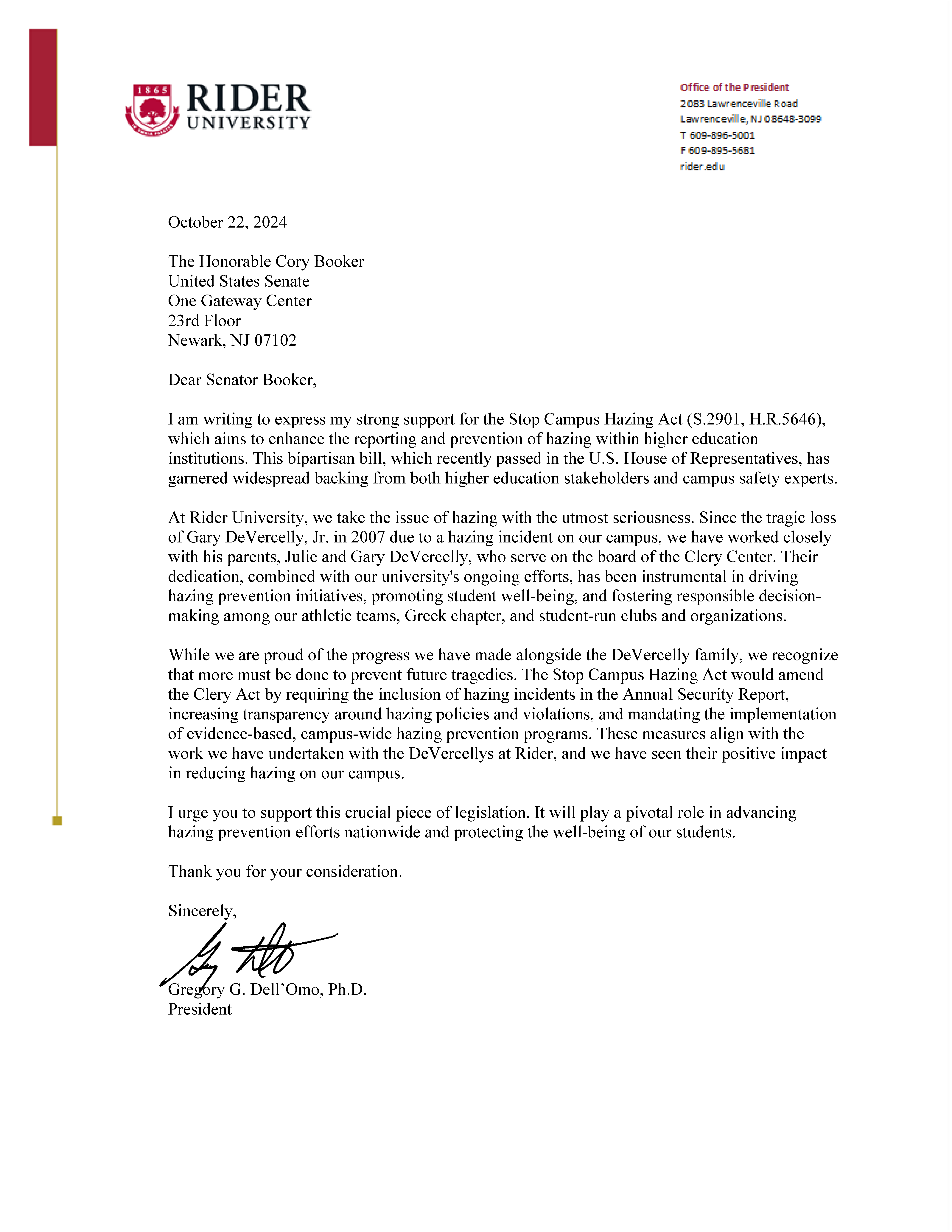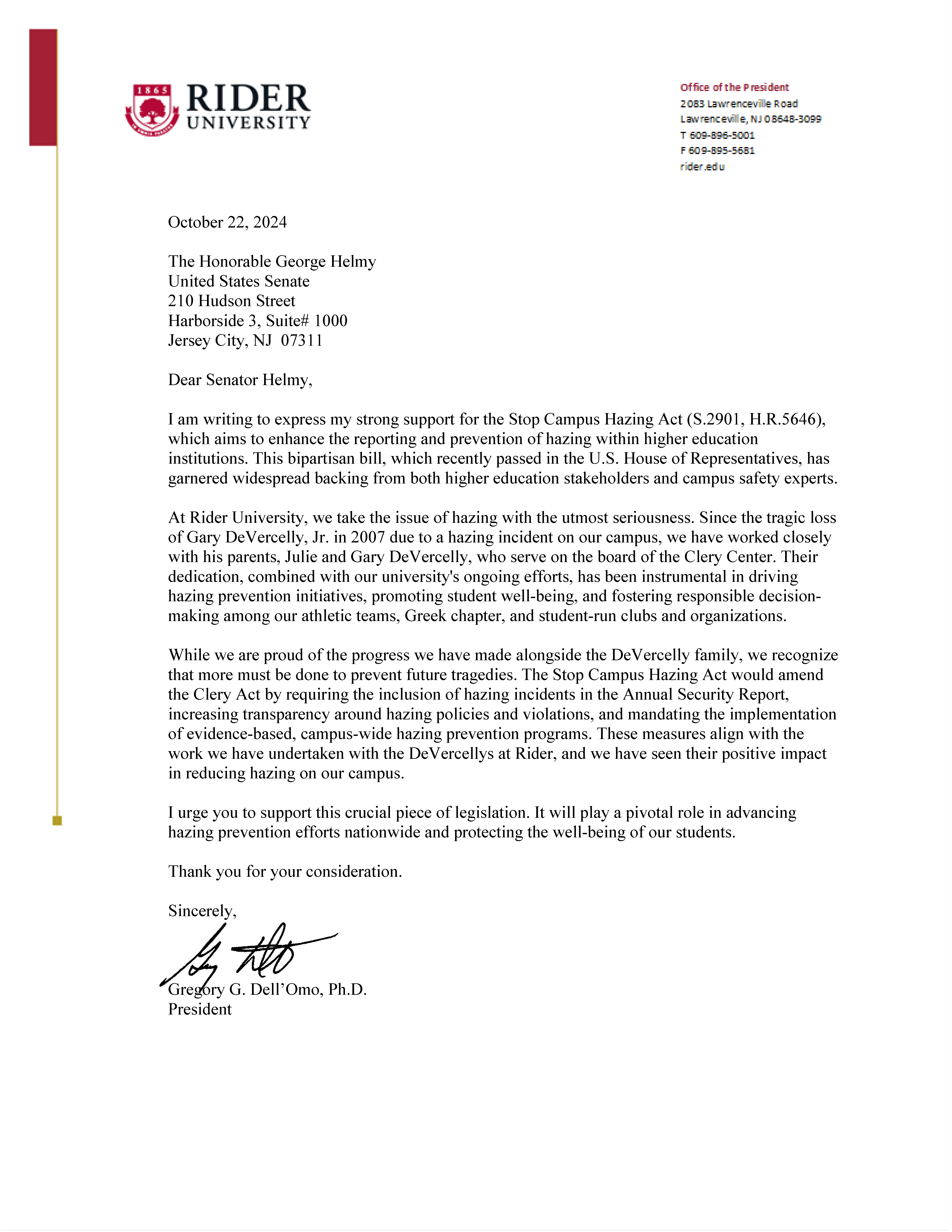Rider University President Voices Support for Stop Campus Hazing Act
Rider University’s commitment to campus safety and hazing prevention is strongly reflected in letters of support for the Stop Campus Hazing Act from President Gregory G. Dell’Omo, Ph.D. These letters, addressed to Senator Cory Booker (D-NJ) and Senator George Helmy (D-NJ), underscore Rider’s dedication to advancing hazing prevention efforts nationwide, especially in the wake of the tragic loss of Gary DeVercelly, Jr., a Rider student who passed away in 2007 as a result of hazing.
The Stop Campus Hazing Act (S.2901, H.R.5646), which passed in the U.S. House of Representatives and now heads to the Senate, would amend the Clery Act to require institutions to include hazing incidents in their annual security reports, enhance transparency of hazing policies and violations, and establish mandatory hazing prevention programs. Rider University has worked closely with the DeVercelly family, who serve on the board of Clery Center, to implement similar initiatives on campus, setting a powerful example for other institutions.
President Dell’Omo emphasizes that this legislation will be pivotal in advancing hazing prevention nationwide. We’re grateful for his advocacy, as well as the ongoing efforts of the Rider community, to help create safer, more accountable campus environments.
Read the letters (click to view larger):


|
|
FOR IMMEDIATE RELEASE
Contact: Kristen Sweeney, Director of Communications, Clery Center at [email protected]
Date: September 24, 2024

Bipartisan "Stop Campus Hazing Act" Passes House, Advances to Senate
WASHINGTON, D.C. – In a significant step toward addressing the dangers of hazing on college campuses, the bipartisan Stop Campus Hazing Act (H.R. 5646, S. 2901) has passed the House of Representatives and is now moving to the Senate for consideration. Co-led by Representatives Lucy McBath (D-GA) and Jeff Duncan (R-SC) in the House and Senators Amy Klobuchar (D-MN) and Bill Cassidy, M.D. (R-LA) in the Senate, the bill represents a unified, bipartisan effort to improve campus safety nationwide.
The Stop Campus Hazing Act builds on the momentum of two previous bills—the Report and Educate About Campus Hazing (REACH) Act and the End All Hazing Act—to create a more comprehensive approach to preventing and reporting hazing incidents. Over 50 organizations, including Clery Center, StopHazing, SAFE Campuses LLC, the American College Health Association (ACHA), the Association of Fraternity/Sorority Advisors (AFA), the Association of Fraternal Leadership & Values, and the Anti-Hazing Coalition, have endorsed the bill.
Since 2017, Clery Center has played a key role in shaping federal anti-hazing legislation, driven by the advocacy of board members Julie and Gary DeVercelly, whose son Gary DeVercelly Jr. was tragically killed by hazing in 2007. “Over the past 35 years, the Clery Act has fundamentally transformed campus safety by requiring crucial measures to improve transparency and prevent harm,” said Jessica A. Mertz, executive director of Clery Center. “The passage of the Stop Campus Hazing Act marks a significant milestone in our ongoing mission to create environments that prioritize the safety and well-being of the campus community. Today, we not only honor the many lives lost to hazing, but we recognize the harmful impact that hazing culture continues to have across the country.”
The Stop Campus Hazing Act will amend the Clery Act by introducing three critical requirements for institutions of higher education (IHEs):
- Hazing Reporting: IHEs must report known incidents of hazing in their Annual Security Report and submit these statistics annually to the Department of Education.
- Transparency Report: IHEs must maintain a publicly accessible transparency report, detailing their hazing policies and listing organizations that have violated those policies.
- Prevention Programs: IHEs are required to offer research-informed, campus-wide hazing prevention programs.
“Policy is a vital component of harm prevention, and I’m confident this research-informed bipartisan bill will make a substantial difference in transforming campus hazing culture,” said Elizabeth J. Allan, Ph.D., Professor of Higher Education at the University of Maine and Principal at StopHazing. “Research shows that many students are uninformed about hazing, so I’m especially encouraged that the bill includes a requirement to educate students about the dangers of hazing.”
Additionally, the bill will rename the Jeanne Clery Disclosure of Campus Security Policy and Campus Crime Statistics Act to the Jeanne Clery Campus Safety Act to reflect its broader scope, which now addresses hazing as part of campus crime prevention.
Advocacy Driven by Family Losses
This legislation has been shaped by the tireless advocacy of families who have lost loved ones to hazing. Members of Congress who supported the bill have often been personally touched by these tragedies in their districts, including the co-leads, Representatives McBath and Duncan.
"[This bill is] about empowering students and families so that they can make an informed decision for themselves about what school they or their loved one attends or the club they may join and hopefully save their lives.," said Representative McBath. "I know the pain of losing a child. The only thing that we can do now is try to harness our pain and do something positive with it."
The dedication of the families raising awareness and the commitment of their representatives has played an essential role in advancing the Stop Campus Hazing Act and preventing future tragedies. “Students should feel safe no matter what school they choose,” shared Senator Cassidy. “The Stop Campus Hazing Act improves transparency and ensures hazing is never ignored.”
Senate Poised to Act on Critical Campus Safety Legislation
The Stop Campus Hazing Act now moves to the Senate, where it is expected to garner further bipartisan support. Advocates are hopeful that the bill will continue its momentum and reach President Biden's desk for signing into law.
“When parents send their kids away to college, they expect they will get a good education and make new friends. Unfortunately, too many are also exposed to hazing, a dangerous—and at times deadly—problem,” said Senator Klobuchar. “Our bipartisan legislation will improve hazing prevention efforts on college campuses to make sure we have the information we need to stop this abuse and keep students safe.”
The passage of this bill in the House marks a historic moment in the fight against hazing on college campuses. Once signed into law, this legislation will build upon the Clery Act’s existing framework to enhance institutional policies, procedures, and prevention efforts, and promote a deeper understanding of hazing’s devastating impact.
“Hazing has almost become an acceptable part of college culture,” said Representative Thompson during the House Committee on Education & the Workforce Markup. “Let me be clear today: Those days are over.” |
|
Announcing New Clery Center Board Members Raquel Kennedy Bergen and Maureen S. Rush
We are pleased to share that we have welcomed two new members to our board of directors, Raquel Kennedy Bergen, Ph.D., and Maureen S. Rush, M.S., CPP. Their rich and multifaceted backgrounds in campus and community safety further enhance our long history of excellence in the field. “Raquel and Maureen are both influential leaders and Clery Center is honored to have their vision and expertise helping to guide our future,” said Jessica Mertz, executive director.
 Raquel Kennedy Bergen has been a devoted advocate for survivors of sexual assault for the past 35 years. She is a professor of sociology at Saint Joseph’s University in Philadelphia, Pennsylvania, and is the faculty moderator for the Rape Education Prevention Program there. She regularly runs workshops on sexual violence in intimate partnerships to domestic violence and rape crisis programs nationwide. Raquel is the author or co-author of numerous scholarly publications and nine books on violence against women including, Wife Rape: Understanding the Response of Survivors and Service Providers; and Issues in Intimate Violence. She edited the Sourcebook on Violence Against Women and Violence Against Women: Classic Statements with Claire Renzetti and Jeff Edelson, and co-edited Violence Against Women: Readings from Social Problems with Claire Renzetti. Her current research continues in the field of violence against women—analyzing the intersection of women’s experiences of physical, sexual and emotional violence with their partners during pregnancy. Raquel Kennedy Bergen has been a devoted advocate for survivors of sexual assault for the past 35 years. She is a professor of sociology at Saint Joseph’s University in Philadelphia, Pennsylvania, and is the faculty moderator for the Rape Education Prevention Program there. She regularly runs workshops on sexual violence in intimate partnerships to domestic violence and rape crisis programs nationwide. Raquel is the author or co-author of numerous scholarly publications and nine books on violence against women including, Wife Rape: Understanding the Response of Survivors and Service Providers; and Issues in Intimate Violence. She edited the Sourcebook on Violence Against Women and Violence Against Women: Classic Statements with Claire Renzetti and Jeff Edelson, and co-edited Violence Against Women: Readings from Social Problems with Claire Renzetti. Her current research continues in the field of violence against women—analyzing the intersection of women’s experiences of physical, sexual and emotional violence with their partners during pregnancy.
 Maureen S. Rush has dedicated 45 years to her career in law enforcement and public safety in the Philadelphia area, beginning with a distinguished 18 years with the Philadelphia Police Department and then 27 years with University of Pennsylvania (Penn). Maureen began her career as one of the first 100 women police officers hired to serve the City of Philadelphia on “street patrol” in a pilot program directed by the United States Department of Justice. She later joined Penn’s Division of Public Safety in 1994 as the Director of Victim Support & Special Services, served as the Chief of the Penn Police Department from 1996 through 2000, and was appointed Vice President for Public Safety in 2000, retiring in December 2021. Maureen also serves as the President of the Philadelphia Police Foundation and Vice Chair of the Philadelphia Police Athletic League. Maureen S. Rush has dedicated 45 years to her career in law enforcement and public safety in the Philadelphia area, beginning with a distinguished 18 years with the Philadelphia Police Department and then 27 years with University of Pennsylvania (Penn). Maureen began her career as one of the first 100 women police officers hired to serve the City of Philadelphia on “street patrol” in a pilot program directed by the United States Department of Justice. She later joined Penn’s Division of Public Safety in 1994 as the Director of Victim Support & Special Services, served as the Chief of the Penn Police Department from 1996 through 2000, and was appointed Vice President for Public Safety in 2000, retiring in December 2021. Maureen also serves as the President of the Philadelphia Police Foundation and Vice Chair of the Philadelphia Police Athletic League.
Please join us in welcoming Raquel and Maureen and learn more about our team and board of directors here. |
December 07, 2021
Announcing new board members Pearl Kim & Beth Riley
Clery Center is very pleased to announce two new members to our board of directors, Pearl Kim and Beth Riley.
Pearl Kim
Pearl Kim was formerly appointed to the Pennsylvania’s Office of Attorney General as a Senior Deputy Attorney General. She served in the Executive Office as part of the senior management team and led the College Campus Safety Initiative across Pennsylvania. Formerly an Assistant District Attorney in the Delaware County District Attorney’s Office, Pearl was Chief of the Human Trafficking Unit in the Special Victims and Domestic Violence Division. As a special victims unit prosecutor, she handled Protection From Abuse matters, child physical and sexual abuse, domestic violence, rape, human trafficking, and Internet Crimes Against Children cases.
Pearl served on the Joint State Government Commission’s Advisory Committee on Human Trafficking and reported back to the PA Senate any recommendations for changes in state law, policies, and procedures and ultimately secured the first trafficking of persons conviction under Pennsylvania’s trafficking statute.
Governor Corbett and Governor Wolf appointed Pearl to the Governor’s Advisory Commission on Asian American Affairs, and she currently serves on the Board of Directors of the Asian Pacific American Bar Association of Pennsylvania. The Legal Intelligencer has recognized her as one of the 2011 Lawyers on the Fast Track, as one of the 2011 Diverse Attorneys of the Year, and as one of the 2012 Women of the Year. The American Bar Association awarded Pearl the Norm Maleng Minister of Justice Award for her efforts as a special victims prosecutor, and she was the recipient of the Government Attorney of the Year Award by the Pennsylvania Bar Association in 2015. Pearl obtained her J.D. from Villanova University School of Law where she was the recipient of the Villanova Achievement Scholarship and received her B.A. from Bryn Mawr College.
Beth Riley, M.D.
Dr. Beth Riley is a gynecologist in Portland, Oregon who has devoted her professional life to improving the health of women and families. She grew up in Pennsylvania, and was a close friend and tennis teammate of Jeanne Clery. After earning a B.A. from Harvard and M.D. from Stanford, Dr. Riley completed her OB/GYN residency at University of California San Diego. She has served as medical director of her group practice, served on multiple hospital committees, and volunteered at Outside In Clinic, caring for homeless and uninsured individuals. She has worked on several projects with Harvard Business School Association of Oregon, providing pro bono consulting services to local nonprofits. Beth is married, with two children in college.
|
|